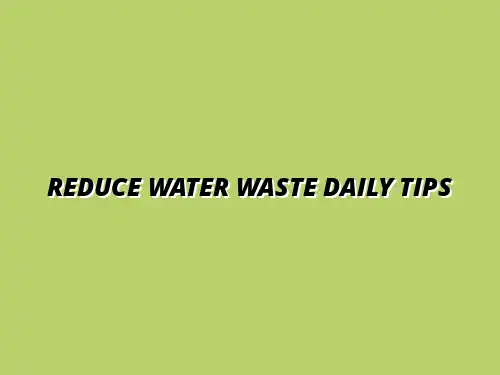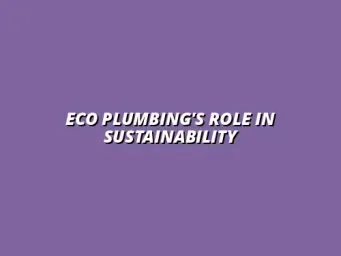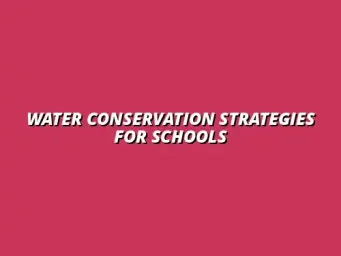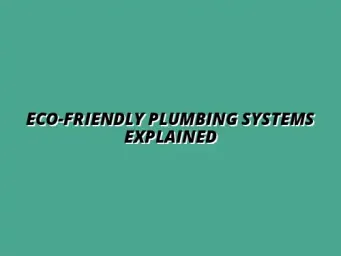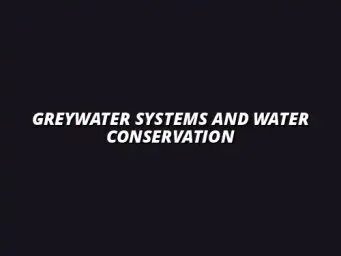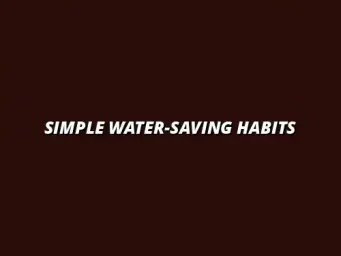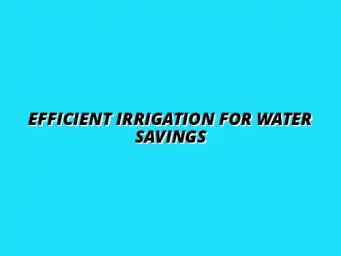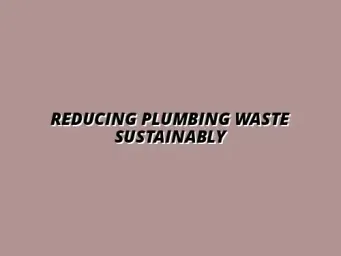Understanding the Impact of Water Waste on the Environment
Water is one of our most precious resources, and its waste can have serious consequences for our planet. To start, it’s crucial to understand what constitutes water waste in our daily activities. Whether it's leaving the tap running while brushing your teeth or overwatering your garden, these small habits can add up to big problems for the environment.
In our homes, we often overlook simple actions that lead to water waste. For instance, taking long showers or not fixing leaks can significantly increase our water usage. By becoming aware of these habits, we can make a conscious effort to change them and contribute to a healthier planet.
Defining Water Waste in Daily Activities
Water waste refers to any unnecessary use of water that doesn’t provide significant value. Common examples include:
- Leaving the faucet running while washing dishes.
- Using a hose to wash driveways instead of a broom.
- Overwatering lawns and gardens.
- Taking excessively long showers.
These habits not only increase your water bill but also strain local water resources. By recognizing these practices, we can collectively take steps to reduce water waste.
Environmental Consequences of Excessive Water Use
Excessive water use can lead to severe environmental issues, including water shortages, habitat destruction, and increased energy consumption. For instance, when we waste water, we also waste the energy required to pump, heat, and treat it. This contributes to pollution and climate change, making water conservation crucial for protecting our planet.
Moreover, over-extraction of water can harm ecosystems, affecting plants and animals that rely on healthy waterways. By reducing our water waste, we help preserve natural habitats and promote biodiversity, which is vital for a balanced ecosystem.
Statistics on Water Waste: A Global Perspective
Water waste is a global issue, and the statistics are alarming! According to recent studies:
- Globally, around 1.3 billion cubic meters of water is wasted annually.
- Households account for about 10% of urban water use, much of which is wasted.
- In some regions, excessive water use can reduce available freshwater supplies by up to 50%.
With these facts in mind, it's clear that we all have a role to play in conserving water. Understanding the impact of our daily actions can inspire us to adopt more sustainable practices, not just in our homes but in our communities as well.
Addressing Frequently Asked Questions on Water Conservation
When it comes to conserving water, I often hear many questions from customers and friends alike. Understanding how to reduce water waste can help us all become more responsible stewards of our precious resources. Let’s explore some common questions together and find out practical solutions!
One of the most effective ways to cut down on water waste is to make simple changes in our daily routines. Here are some suggestions:
- Fixing leaks promptly
- Using water-efficient appliances
- Shortening shower times
- Collecting rainwater for watering plants
How Can Technology Help in Minimizing Water Usage?
Technology plays a crucial role in helping us save water effortlessly. With the advancements in smart home devices, we have more control over our water consumption. For instance, I’ve found that smart irrigation systems can significantly optimize how much water my garden receives!
Here are a few examples of technology that can aid in water conservation:
- Smart shower heads that limit flow
- Automatic leak detection systems
- Water usage monitoring apps
- Smart sprinklers that adapt to weather conditions
What Role Does Community Play in Water Conservation Efforts?
It’s amazing how much we can accomplish when we work together as a community! Local initiatives can spread awareness about the importance of water conservation, and encourage everyone to adopt more sustainable practices. I’ve seen firsthand how community programs can make a positive impact!
Here are some community-focused actions you can take:
- Organizing local clean-up days
- Hosting workshops on water-saving techniques
- Creating neighborhood water conservation challenges
- Collaborating with schools to educate children
Encouraging Sustainable Water Practices in Daily Life
Creating awareness about water conservation is vital! We can inspire our friends, family, and neighbors by sharing easy tips and practical ideas. It’s a wonderful way to foster a culture of sustainability in our community.
For instance, I often share my personal water-saving experiences, like using a rain barrel for my garden or switching to low-flow showerheads. It makes a difference, and it’s easy to encourage others to try these methods!
Developing a Personal Water Conservation Plan
Creating a personal water conservation plan is a fantastic step towards being more mindful of our usage. It can be as simple as tracking daily water use and setting specific goals for reduction. Here’s how to get started:
- Assess your current water usage
- Identify areas for improvement
- Set realistic conservation goals
- Monitor progress regularly
Reflecting on the Benefits of Reducing Water Waste
By conserving water, we’re not just helping the environment; we’re also benefiting ourselves! A commitment to water conservation leads to a positive environmental impact and can save us money in the long run.
The Positive Environmental Impact of Water Conservation
When we reduce water waste, we contribute to a healthier ecosystem. Less water usage means that our water supply can sustain itself better, which ultimately helps preserve our natural habitats!
Some significant benefits include:
- Decreased water pollution in local rivers and lakes
- Less energy consumed in water treatment
- Improved health of plants and wildlife
Long-term Financial Savings from Reduced Water Consumption
Everyone loves saving money! Reducing water consumption can lower your utility bills, leaving you with more cash for fun activities. It feels great knowing that simple changes can lead to financial rewards!
Here are ways to see financial savings:
- Lower water bills
- Reduced energy costs related to heating water
- Less spending on lawn care and landscaping
Taking Action Towards Water Conservation
It's time to take action! Together, we can inspire others to join in the water-saving movement. Every little effort counts, and when we share our experiences, we can motivate those around us!
Inspiring Others to Join the Water-Saving Movement
Get involved in your community and share your passion for water conservation! It could be as simple as starting a conversation with neighbors or sharing informative posts on social media. I’ve found that when I talk about the difference conserving water makes, others are eager to join!
Some ways to inspire others include:
- Hosting a workshop on water-saving techniques
- Sharing success stories in local newsletters
- Starting a community challenge to reduce water use
Resources for Further Learning on Water Conservation Techniques
Staying informed is essential for effective water conservation. There are many resources available that can help us learn more about reducing water waste. Here are a few to get started:
- Local environmental groups and workshops
- Online courses on sustainable practices
- Books and articles about water management
Together, we can make a significant impact on reducing water waste in our homes and communities! Let’s embrace sustainable practices and inspire others to do the same. It's a journey worth taking!

